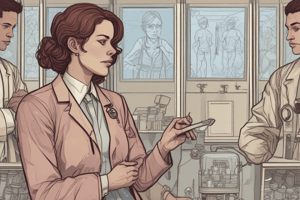Podcast
Questions and Answers
Who desires medical assistance to transition from one sex to another?
Who desires medical assistance to transition from one sex to another?
Transsexuals
What does socioeconomic class refer to?
What does socioeconomic class refer to?
A group of people sharing similar levels of income, education, occupation, and social status.
Which of the following is NOT a determinant of socioeconomic status?
Which of the following is NOT a determinant of socioeconomic status?
- Education
- Occupation
- Income
- Political beliefs (correct)
Cultural variation refers to the similarities in social practices across cultures.
Cultural variation refers to the similarities in social practices across cultures.
What does political identity refer to?
What does political identity refer to?
What is gender defined as in the context provided?
What is gender defined as in the context provided?
Which of the following terms describe a person attracted to the opposite sex?
Which of the following terms describe a person attracted to the opposite sex?
What is a transgender person?
What is a transgender person?
Which field of study focuses on politics?
Which field of study focuses on politics?
How is culture characterized according to the content?
How is culture characterized according to the content?
Flashcards are hidden until you start studying
Study Notes
Understanding Key Concepts in Culture, Society, and Politics
-
Transsexuality: Individuals desiring medical assistance to transition between genders are identified as transsexuals, engaging in sexual reassignment processes.
-
Socioeconomic Class: A social grouping based on shared income, education, occupation, and social status, significantly affecting access to resources and quality of life.
-
Determinants of Socioeconomic Status: Includes income, asset values, savings, education, cultural interests, hobbies, and social networks like peers and relatives.
-
Political Identity: Represents an individual's attitudes and practices regarding political systems and societal actors, informing their engagement in politics.
-
Diversity: Encompasses an appreciation of individual uniqueness rather than mere differences, emphasizing acceptance and inclusivity.
-
Evolutionary Differences: The interplay of biological and environmental factors leading to adaptations and variations over time across cultures.
-
Cultural Variation: Highlights the extensive diversity in social practices among various global cultures.
-
Nationality: The concept of identity associated with being part of a specific nation or country.
Social Differences and Variations
-
Social Differences: Includes aspects such as gender, socioeconomic status, political identity, and religion that distinguish individuals and groups.
-
Gender Definition: A socially constructed set of behaviors and roles deemed appropriate for men and women, differing from biological sex, which pertains to physical characteristics.
-
Subculture: A group with distinct mores, folkways, and values that diverge from those of the broader society, representing a culture within a culture.
-
Pop and High Culture: Distinctions within culture based on social class and societal influence, where high culture typically refers to elite, sophisticated art forms, while pop culture embraces mainstream and popular trends.
Disciplines Related to Culture and Society
-
Anthropology: Focuses on studying humans and cultures, examining social changes and human behavior.
-
Sociology: Analyzes societies, studying social institutions, organizations, and structures.
-
Political Science: Investigates politics, exploring the conduct of political actors, governance, and institutional dynamics.
Understanding Gender Identity and Sexual Orientation
-
Transgender: Refers to individuals whose gender identity does not align with the sex assigned at birth.
-
Sexual Orientation: Encompasses various attractions:
- Heterosexual: Attraction to the opposite sex.
- Homosexual: Attraction to the same sex.
- Bisexual: Attraction to both sexes.
- Asexual: Lack of sexual attraction to any sex.
- Pansexual/Polysexual: Attraction to multiple gender identities.
Culture Characteristics
-
Definition of Culture: Encompasses the collective beliefs, practices, values, laws, norms, artifacts, symbols, and shared knowledge of a society.
-
Culture as Learned: Refers to the acquisition of diverse habits, skills, and behaviors through socialization and community interactions.
Studying That Suits You
Use AI to generate personalized quizzes and flashcards to suit your learning preferences.

